CALL OF THE WILD
By Dustin O’Regan
Giraffes and zebras in Chobe National Park.
By Dustin O’Regan
Giraffes and zebras in Chobe National Park.
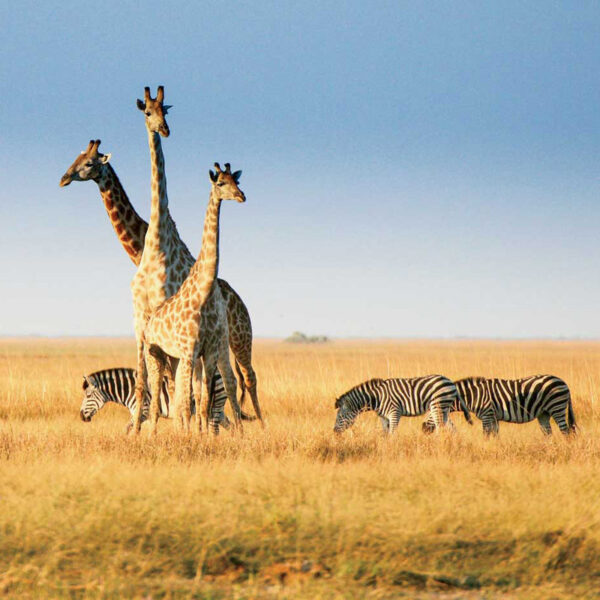
One adjective comes to mind with the mention of southern Africa—soulful. Its exquisite natural beauty, the wildness of its furred and feathered inhabitants, and the beauty of an African sunset … all are, with a nod to Shakespeare’s The Tempest, “the stuff that dreams are made of.”
I recently ventured through Botswana with my high school best friend and a group of intrepid travelers hailing from all corners of the globe. We chose to travel with Desert & Delta Safaris, one of Botswana’s oldest and most recognizable safari brands.
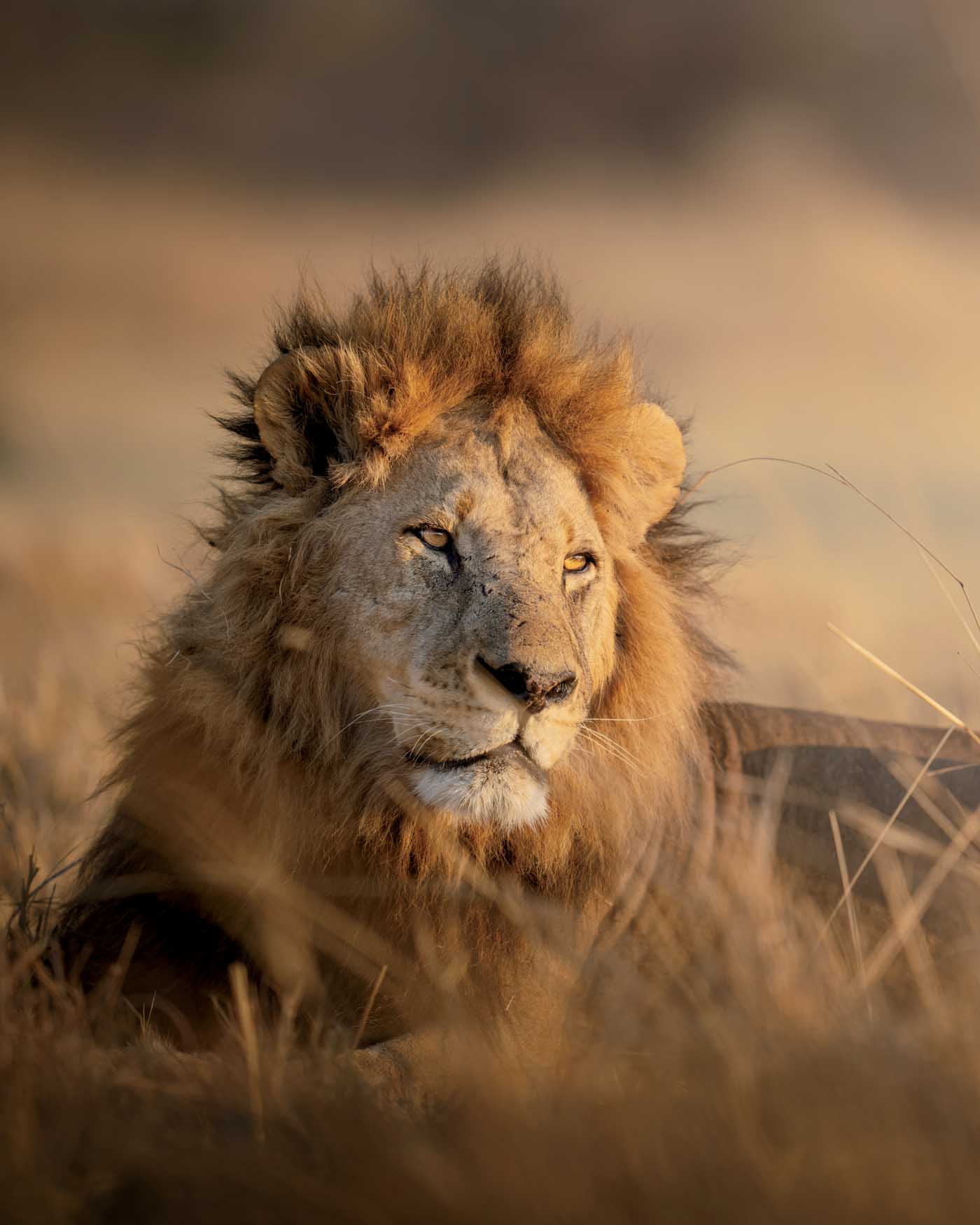
The company is a continent leader in ecotourism—think electric vehicles and solar-powered boats—and focuses on the empowerment of the country’s residents—98 percent of lodge staff positions are held by Botswana citizens. The company has nine premier safari properties that create a circuit allowing guests to experience the country’s diverse regions. We spent time at two lodges—the Chobe Game Lodge, Botswana’s oldest five-star hotel (where Elizabeth Taylor married Richard Burton) and Camp Moremi located on the beautiful Okavango Delta.
We visited during the “green season” for 10 days, which were full of more exhilarating moments than I could recount. During late October through March, you’ll find green leaves, undulating grasslands, and plentiful sources of water. It is the perfect season for adventurers who enjoy the challenge of spotting animals through dense foliage and driving deeper into the bush to discover wildlife that no longer need to congregate for water at the river’s edge.
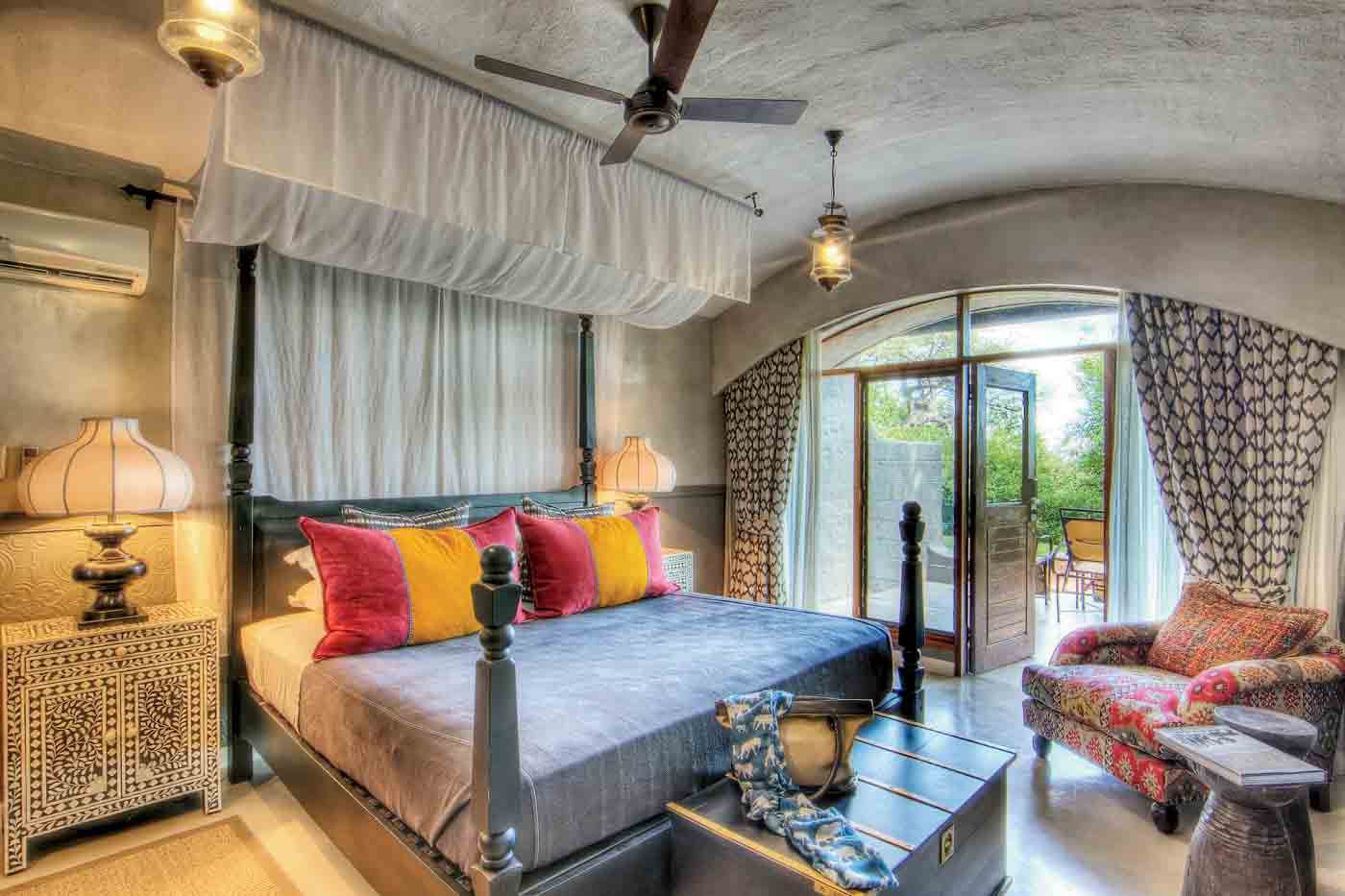
The Chobe Game Lodge is the only riverfront lodge in the Chobe National Park, a wildlife paradise known for its huge herds of elephants and lush landscape. The park lies in Botswana’s far northeastern corner near the juncture of four countries—Botswana, Namibia, Zambia, and Zimbabwe.
We flew into Kasane airport where a Desert & Delta Safari representative greeted and drove us the short 20-minute trek to the Chobe National Park entrance. Our adventure began even before reaching the hotel when we glimpsed a herd of hippos precariously perched on what appeared to be a marshy outpost in the river. A few minutes later, we came upon an immense, trumpeting elephant with giant flapping ears, reminding me of a little boy waving his arms and exclaiming, “Hello, hello.” Just past a gate (intended to keep larger animals at bay), appeared the Chobe Game Lodge—an impressive, amber-colored stucco structure half hidden by a huge fountain splashing at the courtyard’s center. After our cool welcome cocktail, we were led to our riverfront suite. En route, we marveled at the lodge’s extensive riverside veranda and large pool with stone surround. The suite was beautifully decorated with gorgeous barrel-vaulted ceilings, quarry-tiled floors, and an elaborate bathroom boasting Arabic motifs. Handcrafted Rhodesian teak furniture and original African carvings created a homey atmosphere. Our private terrace overlooked the lawn and river.
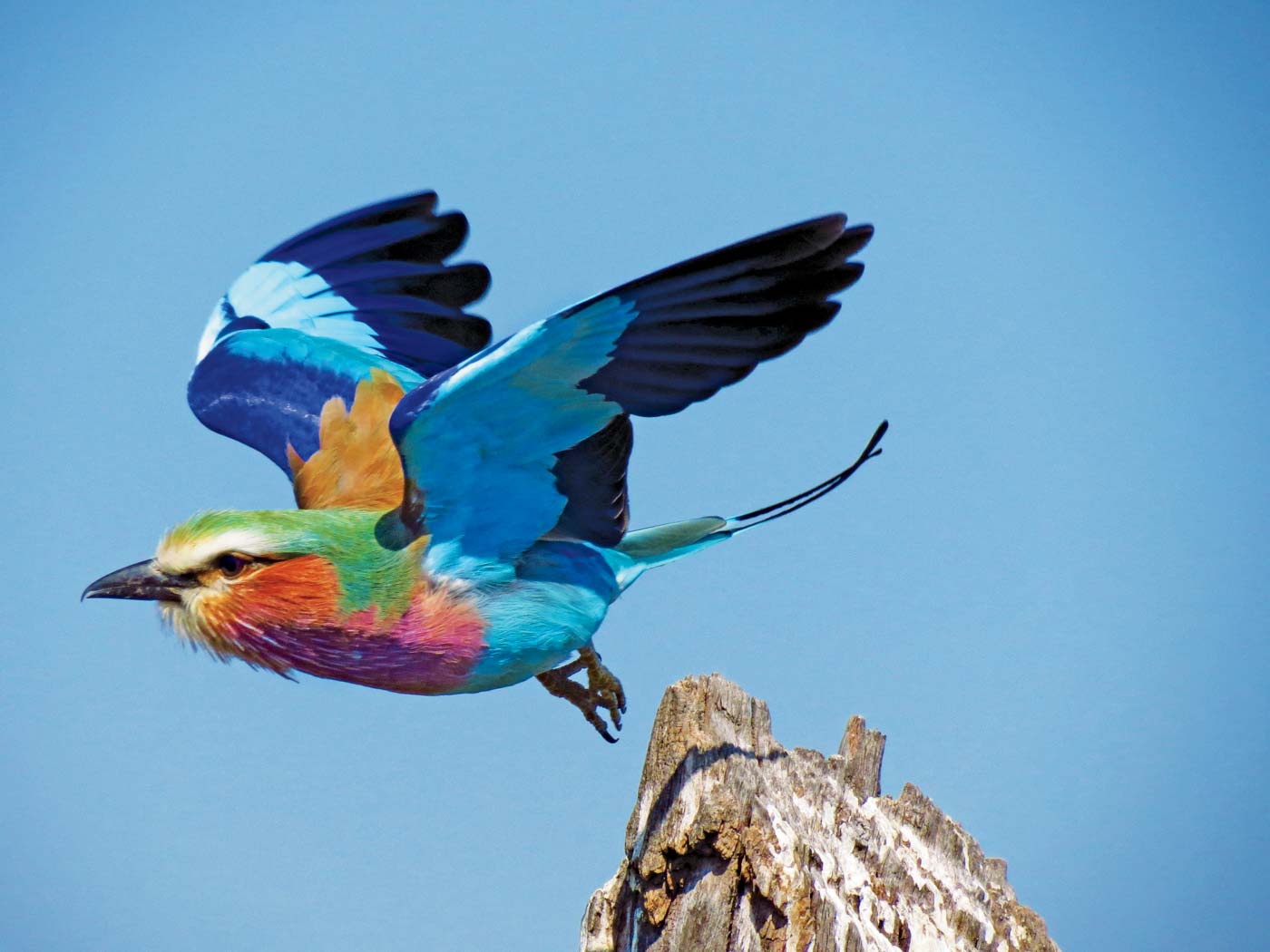
Each day at the lodge included a combination of river safaris and game drives with our guide, Tussaud. Desert & Delta Safaris’ corporate principle of empowerment has a particular focus on women. Tussaud explained that Chobe Game Lodge has an all-female guiding team dubbed the “Chobe Angels,” which has raised the profile of female guiding throughout Africa. Tussaud’s pride in her company was so evident she wore it like a badge on her pressed khaki uniform.
Typically, we rose before dawn and headed out on a game drive to track animals who favor the early slices of light. Breakfast awaited us on our return and my daily choice—the Chobe Joe— consisted of minced beef on toast with peri peri sauce. We then would head out on a mid-morning river cruise followed by lunch. On hot afternoons, our plush beds and air-conditioned quarters beckoned naps.
The afternoon respite was followed by a sunset cruise or game drive culminating with the “sundowners,” the famous African tradition of cocktails and appetizers at sundown. African sunsets splash the most beautiful pinks, oranges, and purples across the sky as the sun dips beneath the horizon. Upon our return to the lodge, the colors gave way to a vast black dome blanketed with stars that lit our path to dinner. The evening often concluded with great conversation around the campfire as laughter floated in the air.
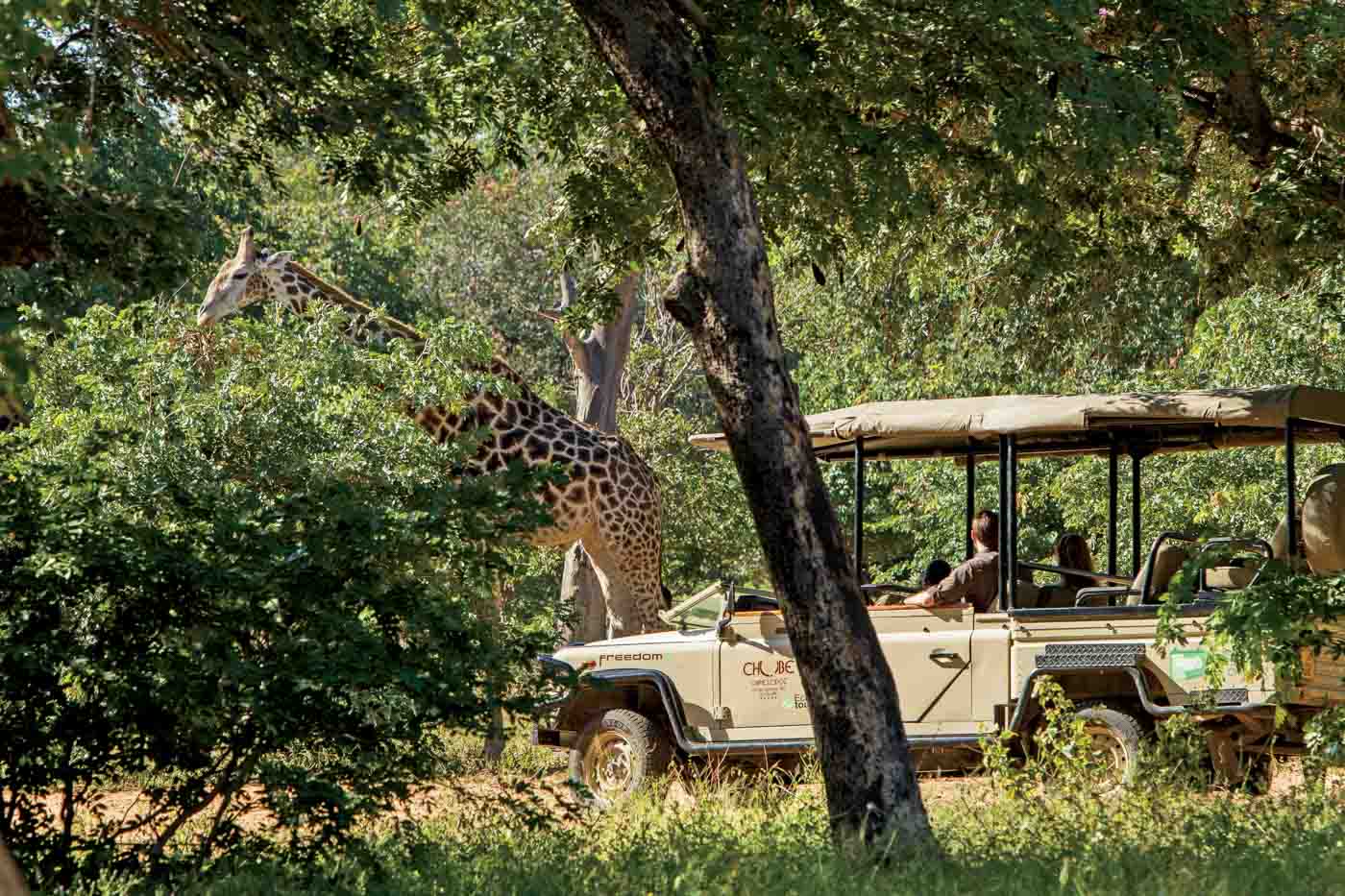
Like life, days on safari were never the same. On our solar-powered pontoon boat, we meandered down the Chobe River cutting a path between Botswana and Namibia. One day it would be a herd of elephants running toward the shore with their babes in tow—some so young it was hard for them to keep up on their teetering little legs. My favorite river safari moment was watching an elephant herd playfully swim in the river using their slender grey trunks as snorkels. The calves rolled on the sandy river bank and crawled over each other in the awkward way of youth—a display of pure uninhibited joy on a sweltering afternoon.
Other days you’d see baboons and impalas who often travel together for protection. The baboons lazily combed through elephant droppings in search of undigested treasures while the impalas pranced along the shore, tails in constant motion.
One breezy day, we happened upon a pod of hippos in a watering hole. When immersed, these “river horses” conceal their massive bodies beneath the water revealing only their snouts and mischievous round eyes. As one enormous mass exited the watering hole after another, the scene resembled a “clown car.” Post exit, they ambled toward the river—a spot favored for its protection of the hippos’ delicate, sun-sensitive skin. Another hippo sighting was equally memorable but not nearly as comedic as we glimpsed two warring hippo bulls on the Namibian side of the river—their testosterone-soaked cries gave me chills!
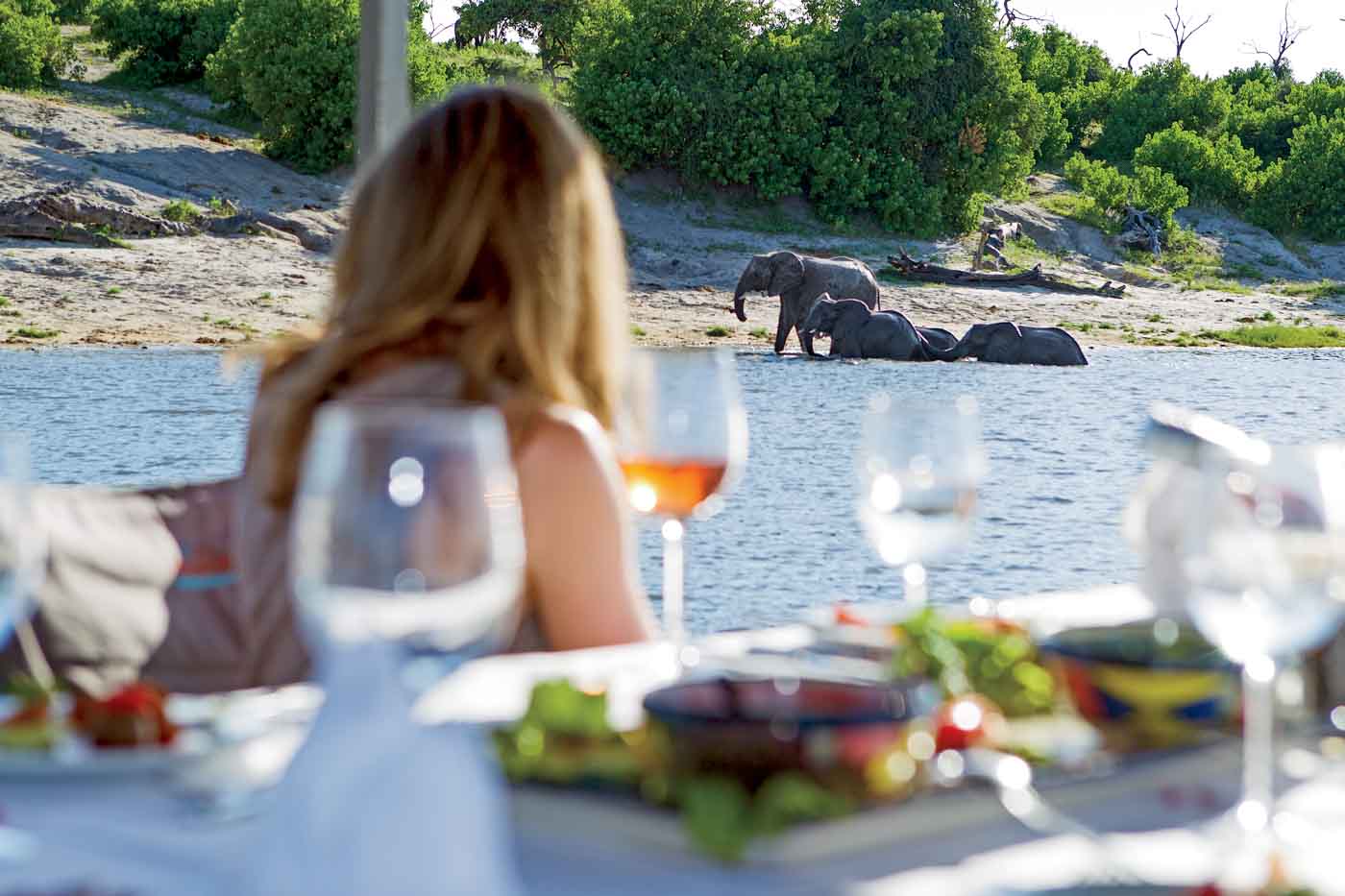
Spotting the Nile crocodile, the world’s second largest, is a coveted river cruise moment. The crocodile tends to exist in two states— swimming in a serpentine pattern on the river’s surface or basking on the riverbanks with its jaw ajar. Both sights are equally terrifying.
Chobe National Park is also a birder’s delight as it is home to more than 400 recorded bird species. Favorites of these feathered creatures include the colorful bee-eater, the bird nicknamed “Jesus” because it appears to walk on water, and the Cape turtle dove whose constant call sounded like a chant of “keep working, keep working” to some or “drink lager, drink lager” to others. It became a running joke between our group, some insisting on the “keep working” verse while others insisted on “drink lager.” When you hear the dove, let me know your vote.
Our daily game drives were as thrilling as the river safaris. The electric, open-glass vehicles allowed silent and unimpeded views of the wildlife. One afternoon, we came upon lions lazing in the shade of Mopane trees. The king of the jungle didn’t appear to fear anyone or anything.
Bumping over the sandy terrain in pursuit of elephants, zebras, impalas, curly-topped water buffalos, spotted hyenas, and giraffes, we passed giant termite hills resembling Angkor Wat’s grand lotus towers. We rarely encountered other cars during these drives—a wonderful aspect of the Chobe National Park.
On our final night, my birthday was acknowledged with a huge celebration and a delicious fruit-topped cake. At least at one daily meal, the staff performed a heartfelt show—sharing African songs and dance routines with their delighted audience.
We bid farewell to our friends at Chobe and headed to the airstrip for our Safari Air flight to the Okavango Delta. Safari Air, a company owned by Desert & Delta, connects the nine safari camps with a fleet of beautiful, air-conditioned planes.
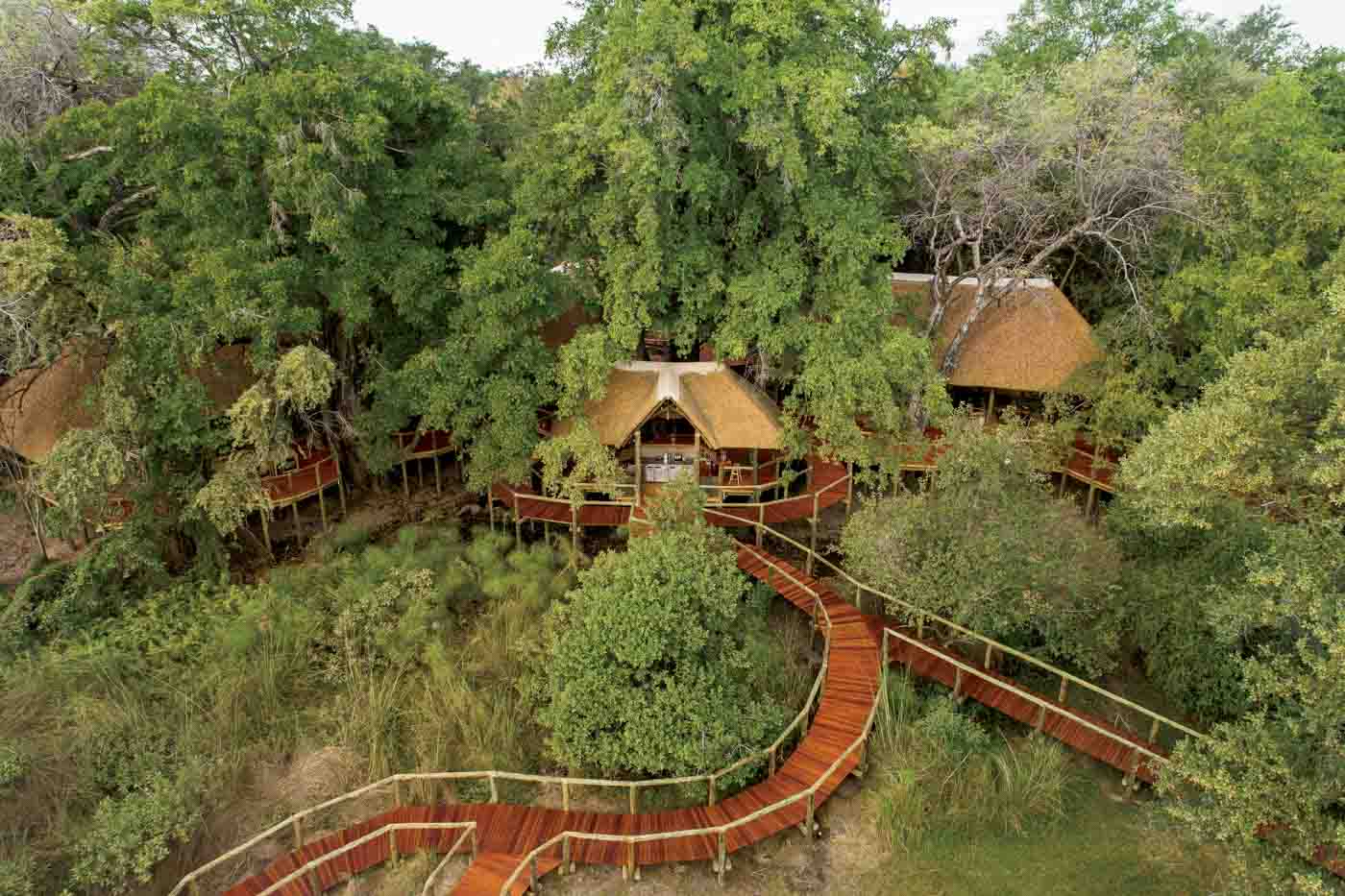
The flight to Camp Moremi offered a glorious view of the marshy Okavango Delta—a vast inland river delta known for its sprawling grassy plains that seasonally flood, becoming an abundant animal habitat. One of the largest wetlands in the world, the Okavango Delta covers almost 2,000 square miles of pristine wilderness including savannahs, winding waterways, and dense forests. In the green season, rainwater from Angola’s lush highlands spills into the delta, setting in motion an ecological spectacle. Fueled by the promise of a fertile floodplain, more than 200,000 large mammals return to the delta.
We landed (after a slight delay due to a family of warthogs trotting down the runway) at Camp Moremi’s Xakanaxa Airstrip in the Moremi Game Reserve. Situated in the east of the Okavango Delta, the reserve is known as one of the most beautiful of its kind.
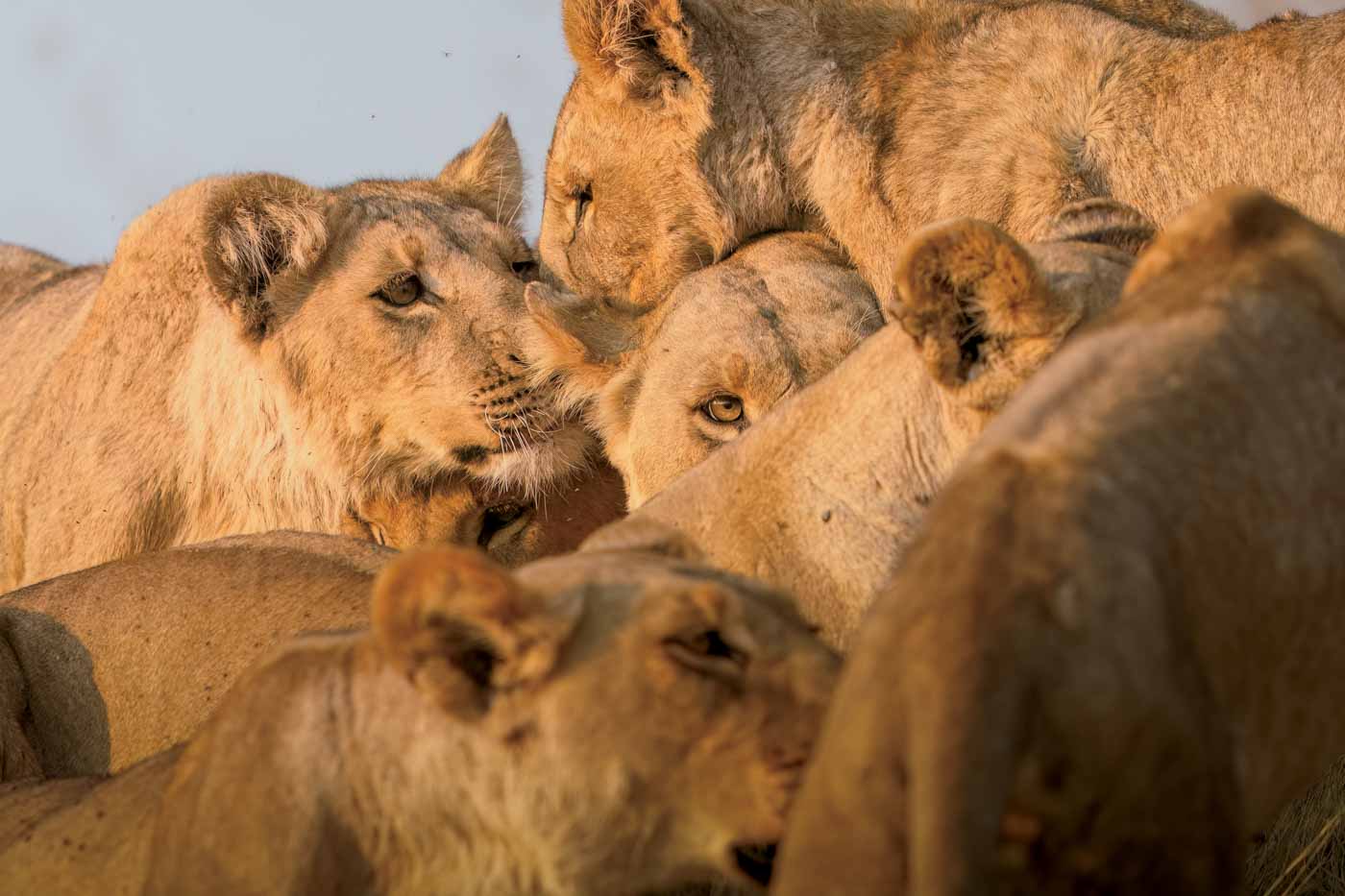
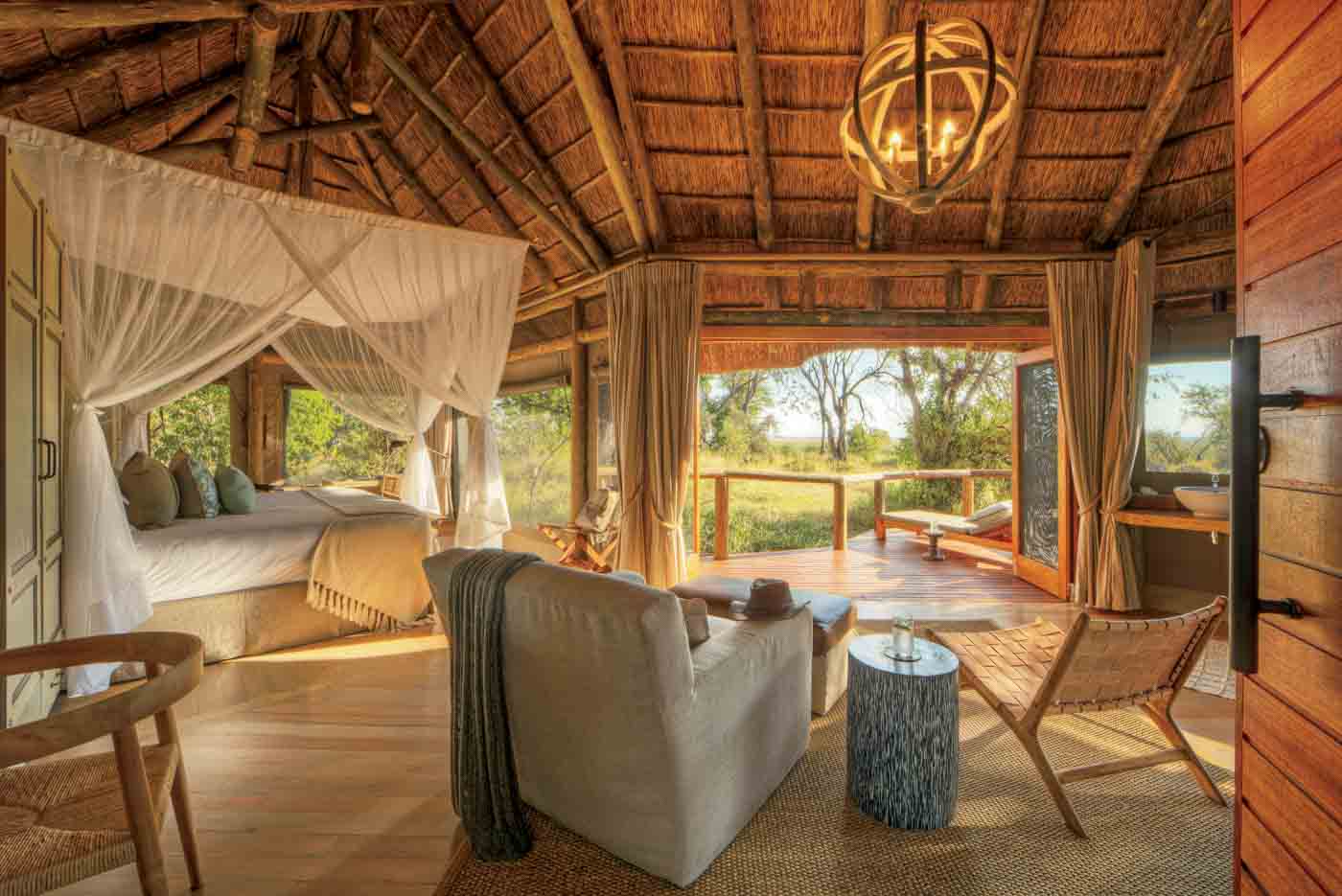
We were greeted by our Camp Moremi guide, Gwist, and climbed into our Toyota Safari Landcruiser. Just like at Chobe, the fun began even before we arrived at our destination. En route to the camp, we encountered a pride of 12 dozing lions. We were mesmerized by the gentle camaraderie among them. One young male with just a whisper of his adult mane, slept with his limbs entwined around his siblings. Every now and again, his giant paw rose to give a leisurely pat to his brethren. After hundreds of photos and many videos, we finally tore ourselves away and drove toward our resort.
Upon arrival, we were greeted by clapping and singing staff members who welcomed us with cool hand towels and cold drinks. Camp Moremi is an intimate camp with huge tents boasting luxurious accommodations—think expansive living rooms, sumptuous mesh-enshrouded beds, and stone-tiled bathrooms with rain showers. The camp is situated on the edge of the Xakanaxa Lagoon in an area well known for its spectacular game-viewing opportunities. A screen “wall” was all that separated us from baboons, water buffalo, and other creatures rolling past our tent on the delta.
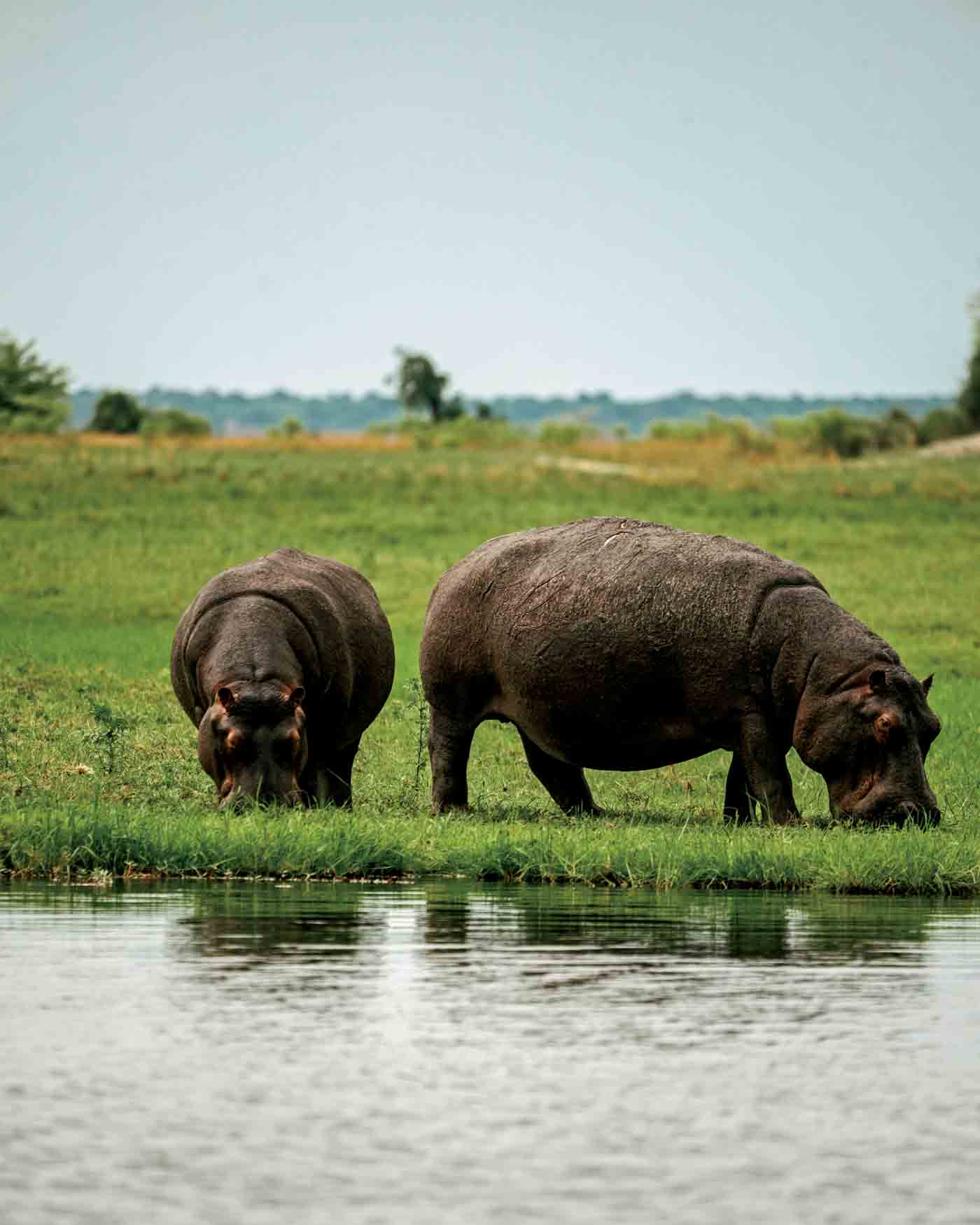
An elevated wooden pathway led us from our thatched safari tent to the main compound, which houses the dining room, library, reception, fire pit terrace, and a pool nestled in the grassy plain.
Like the Chobe Game Lodge, Moremi offers both river safaris and game drives. The delta’s waterways are a series of narrow serpentine passages flanked by head-heavy billowing grasslands. Therefore, small, narrow boats are used to traverse the delta, setting us at eye level with the coast and putting us in closer proximity to the lurking hippos.
The safari vehicles were like those at Chobe and perfect for unobstructed views of wildlife. Gwist noted that his favorite “newspaper” was laid out beneath us in the golden sand—it kept “track” of who went where and in what direction. Gwist’s readings led us to a dazzle of zebra—the gorgeous striped creatures grazed with foals (who wear a lighter chocolate brown stripe) at their sides. The “paper” also directed us to a tower of giraffes—the elegant foursome swanned along the sand through tall sausage trees. During one game drive, a herd of elephants seemed to appear out of thin air. Although these leather-skinned creatures are giants, they are silent walkers. It’s as if they tiptoe through the bush wearing enormous slippers.
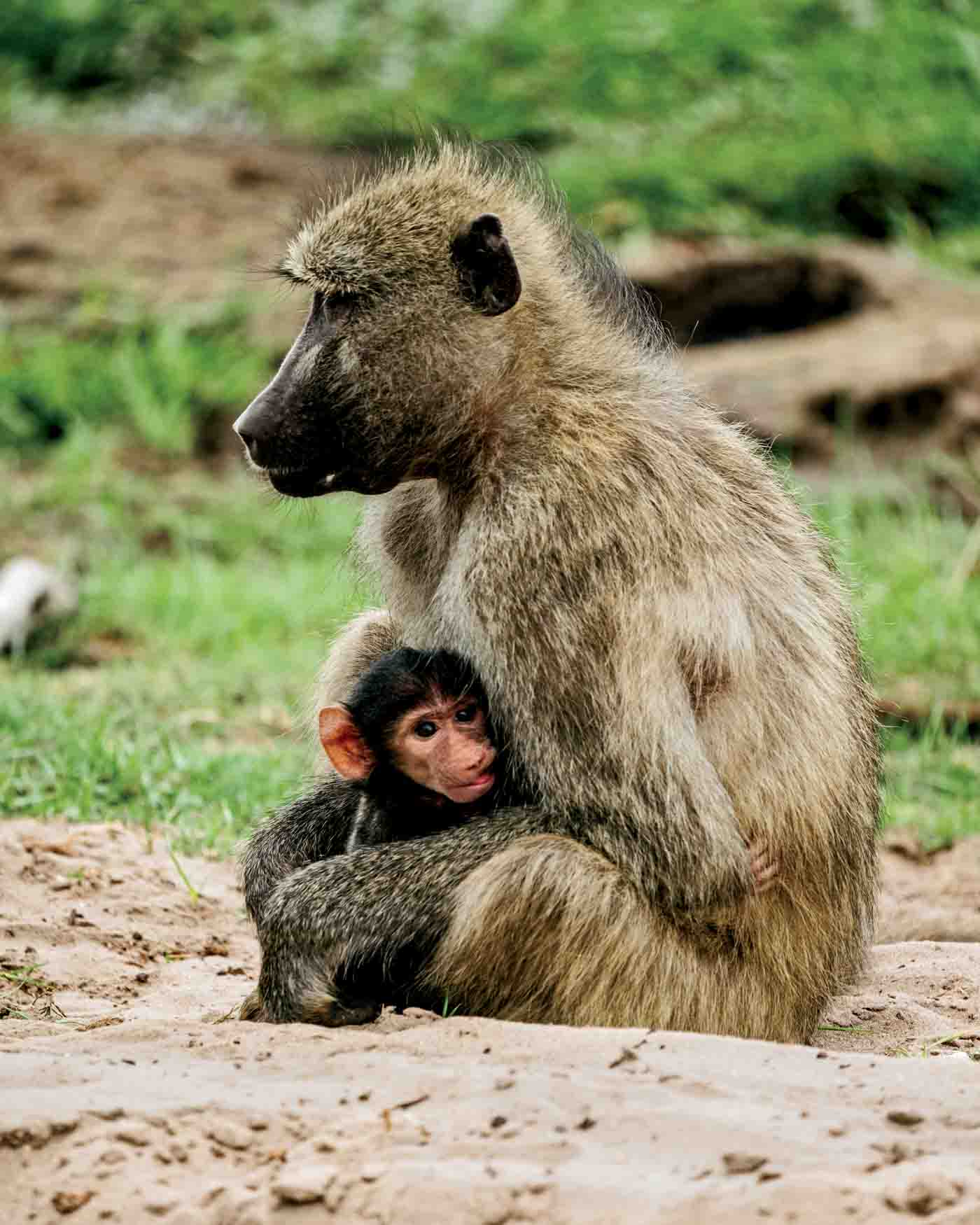
Moremi’s game drives felt more “wild” than those at Chobe. We saw two pythons on the reserve—one was mid-meal, consuming a giant desert hare. We also encountered a pride of lions devouring a wildebeest as two hungry hyenas circled in search of leftovers. On our final game drive, our eagle-eyed guide spotted a dung beetle rolling a ball of dung. These insects entice mates based on the size of said stinky balls—a bit of information that caused an eruption of scatological-laced laughter from our group. Early one morning, Gwist motioned toward a snaggletoothed hippo while simultaneously reversing the jeep. Apparently, that particular hippo is rather hostile and better to avoid. Later that day, my friend and I were headed to dinner when we noticed a hippo right next to the pathway—terrified, we quickened our pace toward the main campus. We later learned that we had met “Oscar,” a friendly hippo who frequented the camp.
A “wildly fun” send-off occurred on our last morning with a troop of baboons whooping on our tent’s rooftop. The furry fellows eventually descended with a large male stopping to stare at us through the screen before journeying on. These thrilling experiences are a constant on safari—appearing as often as emails in our inboxes on a typical workday at home, but so much more meaningful.
Visit Botswana and discover the majesty and mesmerizing beauty of nature. Desert & Delta Safaris offers luxurious accommodations, expert guides, and unmatched experiences of viewing animals in their natural habitat. Book now, the lions, elephants, giraffes, zebras, baboons, and of course, the hippos are waiting to enchant you.
For more information visit desertdelta.com.
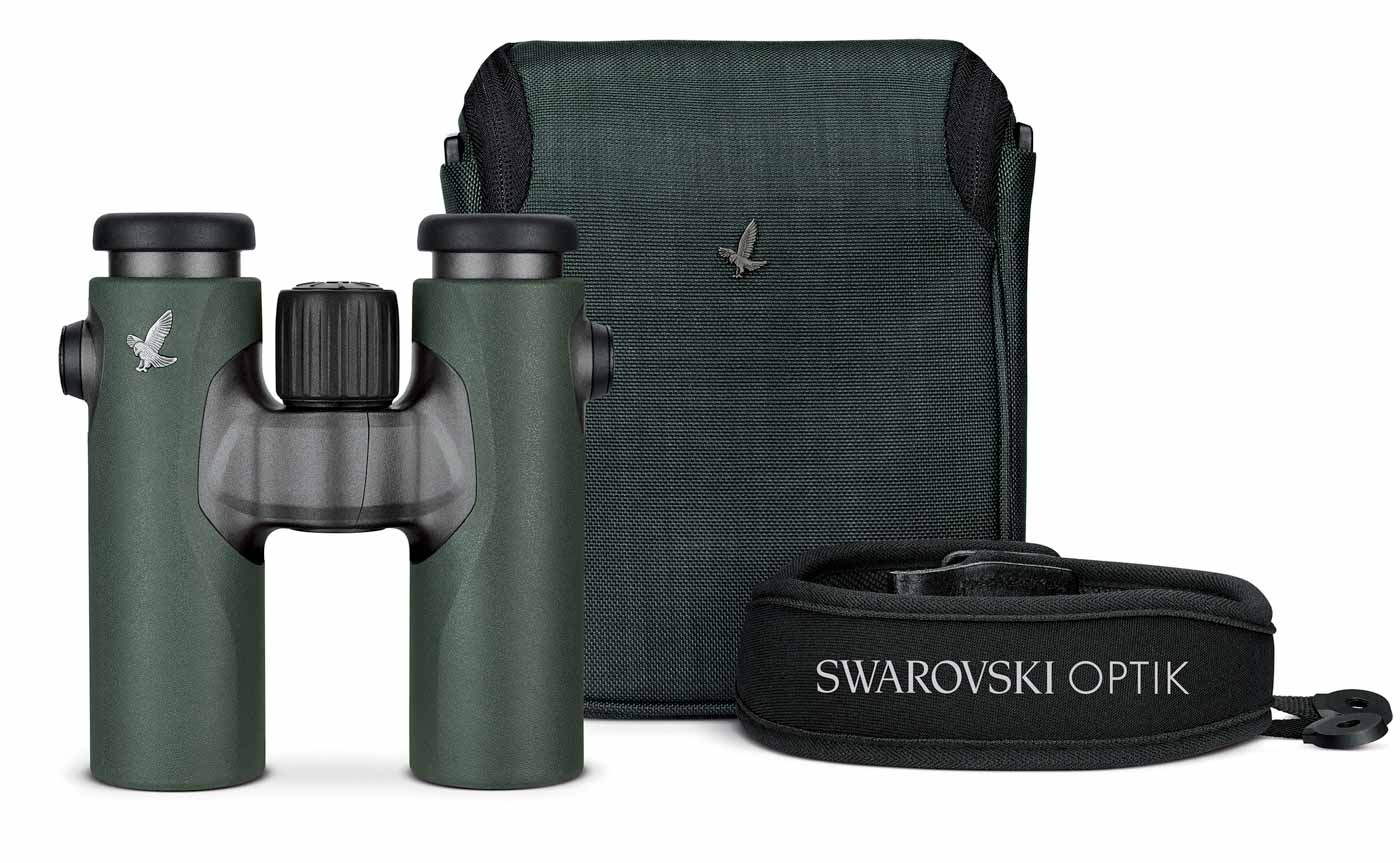
I highly recommend traveling with Swarovski Optik’s binoculars. We used Swarovski Optik CL Companion 8×30 which brought every experience 8x closer. Another must is the Swarovski VPA phone adapter that connects your smartphone to the binoculars so you can easily photograph magical moments. Using the phone adaptor allowed me to capture moments so closely that it looked as if I were lying with the pride of lions—feeling the heat of their breath on my cheek. The company is the world’s leading manufacturer of high-precision optical instruments and I love the company’s motto—to care for the environment, protect nature, and preserve biodiversity. The binoculars and adapter are compact and lightweight making them an easy addition to your suitcase and a great accessory as you bump around in a safari vehicle.
Sign Up for the JWC Media Email